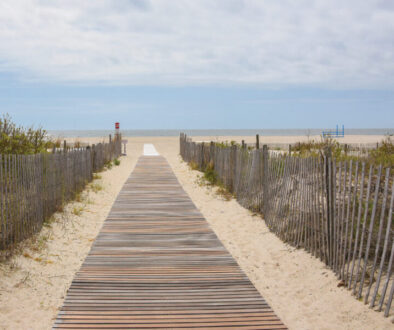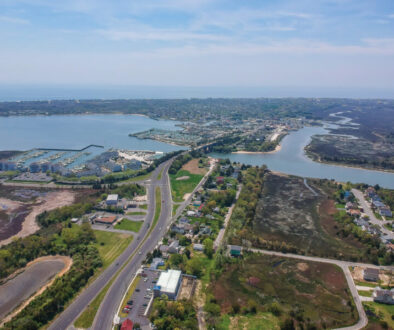Big Fish
The past, present and future of Lund’s Fisheries

In a rowboat or at the local swimming hole, fishing can be a restful, even contemplative pastime.
Commercial fishing, not so much. The profession is known for backbreaking labor, long stretches at sea, and often hazardous conditions. Almost every year, fishing ranks at the top of the U.S. Bureau of Labor Statistics’ list of the most dangerous jobs on earth, ahead of both logging and law enforcement.
Perhaps for these reasons, it’s been dramatized and even glamorized in literature, movies, and the popular imagination. The fisherman of lore is square-jawed, flinty-eyed, and tough enough to take on a force mightier than himself: the sea.
Jeff Reichle, chairman of Lund’s Fisheries in Cape May, probably agrees with that characterization. Over the past 65 years, Lund’s Fisheries has grown from a single fishing boat to one of the largest seafood companies in the east. Working with scientists and lawmakers, it’s also helped keep those fish jumpin.’
“Fishermen are a rare breed—proud and hard-working, the last of the truly independent operators in this country,” says Reichle. “Fishermen are smart. They work hard. They have a strength and calmness in uncertain situations. These are strong people, and good people too.”

‘Science Projects’
This is no textbook trade; most East Coast seamen learn their lessons on the job, and on docks, ship decks, and open water from the Carolinas to New England.
For all its hardships, commercial fishing can be financially rewarding; it’s not uncommon for crew members to earn $100,000-plus per year, and captains can make a lot more. But they sweat for every penny, and success is never guaranteed. If the fish don’t bite, the fishermen don’t get paid.
“And when they struggle,” adds Reichle, who buys and sells their catch, “we struggle.”
Today, he’s glad to report, Mid-Atlantic fisheries are doing well, in part due to sustainability efforts that began with the 1976 Magnuson-Stevens Act. The federal legislation sets catch limits and quotas designed to replenish depleted stocks and conserve essential habitat, helping to ensure that seafood is consistently plentiful.
“The industry went through some hard times when they started putting quotas in,” Reichle says. “We were over-boated in many ways; the traditional fisheries that people depended on were severely cut—summer flounder, scallops, porgie, black seabass.”
Fishermen were accustomed to working in unregulated waters, hauling in whatever they wanted, as much as they wanted, so the new rules hit a wall of resistance. More than 40 years later, while it’s still a subject of debate, it’s hard to argue with the results. By extending U.S. jurisdiction from 12 nautical miles to 200 miles offshore, the legislation prevented foreign fleets from plundering domestic resources. It also enabled U.S. fishermen to build joint ventures with those international operators, trading products and new technologies to everyone’s benefit. Today, a reported 90 percent of U.S. fisheries fall below their annual catch limits.



“We’re working under the strictest regulations in the world. We’re the model for other countries that struggle with the same thing we struggled with 20 or 30 years ago,” says Wayne Reichle, Jeff’s son and president of Lund’s Fisheries. “The fishermen of Cape May and our company are working with scientists and our government to make sure we’re fishing sustainably.”
In other words, there are plenty of fish in the sea. And Lund’s Fisheries wants to keep it that way.
To that end, Jeff Reichle cofounded the Garden State Seafood Association, which represents the interests of New Jersey fishermen in Trenton and on Capitol Hill. Its nationwide Seafood Coalition monitors the Atlantic, Pacific, and Gulf coasts for any conditions that could adversely affect the commercial fishing industry. Recently, for example, the GSSA came out against offshore drilling and seismic air gun testing in the Atlantic, and in favor of global shark preservation.
According to Jeff Reichle, each year the GSSA picks “10 to 20 ‘science projects,’” working with National Marine Fishery Service and other organizations in the interest of maintaining healthy fish stocks. And fishermen are a key part of the think tank. “They may not have PhDs after their names, but fishermen are pretty smart, and they’ve proven it to these scientists, time and time again. The cooperation between scientists and fishermen has given a lot of respect on both sides.”
“It’s not a hobby,” adds Wayne. “Three generations of investment and our lives depend on it.”
Captains of Industry
As a way of life, fishing is often passed from father to son and occasionally to daughter (the statistics on women in the industry are scant and contradictory, ranging from about 4 percent to 14 percent, depending on the source).
The Reichles, like most others in the business, started at the start and learned by doing. Jeff Reichle was recruited by his father-in-law, Wayne Halbruner, who was partner with Warren Lund in a fishing boat. “I knew nothing about seafood, zero.” He earned his keep by working the dock, unloading boats, sorting fish, packing them in boxes, loading the trucks.
Company founder Warren Lund was a generous employer, he says, eager to delegate authority so he could pursue his passion for RV’ing. “He trained me. My favorite part was the buying and selling, setting up processing operations and making new investments so we’d be able to do more.”
Until the early 1980s, Lund’s dealt only in fresh fish, wholesale and retail, delivering it day and night to purveyors up and down the east coast (including to New York’s famous Fulton Fish Market). When Lund’s built its first freezer plant, it was a turning point.
“A big day for us back then was to unload 40,000 to 50,000 pounds of fish,” says Jeff. “Today we can do about 1.1 million pounds a day, all sustainably harvested. Our fisheries are unbelievably well managed.”



Indeed, Lund’s is presently one of the largest seafood processing facilities in the east. It has two West Coast locations, in Monterey and outside Los Angeles, and is the only domestic producer of three squid fisheries. It sells its wares around the world and even on QVC, the home shopping channel based in West Chester, Pennsylvania.
One of the men who keep the fish coming in is Mike Cox, captain of the 73-foot Jersey Cape. He and his seven-man crew spend about 250 days per year out at sea, trawling for sea bass, fluke, squid, and scallops. They labor 17 hours on, six hours off. If the work is grueling, it’s balanced out somewhat by the pay: “Last year our deckhands made $150,000,” says Cox, “and everybody in the wheelhouse got $300,000.” It’s not just the money that drives him. A Cape May native and the son of a commercial fisherman, Cox can’t imagine doing anything else. “Fishing is second-hand to me,” he says. “It comes natural.”
He admits he feels a twinge every time he heads back out, leaving behind his wife and two small children. “When I call home every morning and talk to the kids, that’s when I want out of it. But to have this talent and not utilize it when we have the opportunity in our backyard—and at this pay—would be stupid. I guess I’m a lifer. I have a son, and hopefully one day I’ll be next to him in his own boat.”
Clint Walker, Lund’s shoreside engineer, maintains the company’s 21 boats, which range from 45 feet to 140 feet long and weigh up to 500,000 pounds. It’s his job to convert the boats to industry standards, retrofitting engines, interiors, and electronics to make them seaworthy. “I was right out of high school, and I’m still doing it 40 years later,” he says. “My father, grandfather and great grandfather fished, but I got off the water a long time ago—too many regulations.”
Asked about commercial fishing’s inherent dangers, he says, “It’s dangerous if you don’t respect the ocean. All boats look big at the dock. But on the ocean, they’re like toys in a bathtub.”
Sales representative Jeff Miller also is a veteran of the industry. He started at just 13 years of age, sorting clams from a seafood warehouse in Philadelphia. He eventually took over that operation. As a seller of fresh fish for Lund’s, he sometimes feels pinched by the state’s strict regulations. “With the catch landings and quotas, I cannot put a truck on the road every day, because I don’t have enough fresh fish. But we do a lot of scallops and squid, a lot of value-add stuff, and we’re venturing into new products just to keep us going. We’re especially proud of our Sea Legend black-label scallops. They’re high-quality, properly graded, and not chemically altered—the premium number one scallop.”
Reeling It In
Despite the vagaries of the business and a changing ocean, Jeff Reichle is confident that U.S. fisheries will continue to do well. “There are always issues of water warming or cooling, fish stocks going up and down. The American public always hears this term ‘overfishing,’ but in fishery science, that’s somewhat of a natural thing, and that’s why we manage the resource.”
For example, he notes, in recent years cod stocks off New England have been at an all-time low, yet haddock are plentiful in the same habitat. “Do we still overfish stock? Yes, we had it four or five years ago, with summer flounder. But this year, we got an 80 percent increase in our quota.”

“Water temperatures have been all over the place in the past 10 years or so,” adds Wayne. “Now we’re seeing cooler water push down the coast, and fish that moved north because of warming waters are now moving back—things like summer flounder, black seabass, porgies, and mackerel. Maybe we went through a 10- to 15-year warming trend and are now on the back end. Who knows? But we’re pretty excited about it. Good things are happening.” Wayne is apparently optimistic in the face of predictions about global warming’s effects on water temperatures. But the future for professionals willing to take on the toughest job in the world is clear—and wide open. Wayne Reichle has been gratified to see an influx of aggressive young captains, though Jeff Miller says recruitment can be hard.
“These days, no one wants to get their hands dirty,” he says. “But in the next 20 years, the people with the dirty hands will be the ones with all the money.”
According to Jeff Reichle, commercial fishers will succeed over the long term only if they join with their peers to guard the health of the ocean and its irreplaceable resources.
“The fishermen take it to heart,” he says. “It’s no good to me to take everything out of the ocean so my son can’t make a living, or his son or daughter. We have to look to the future all the time.”



